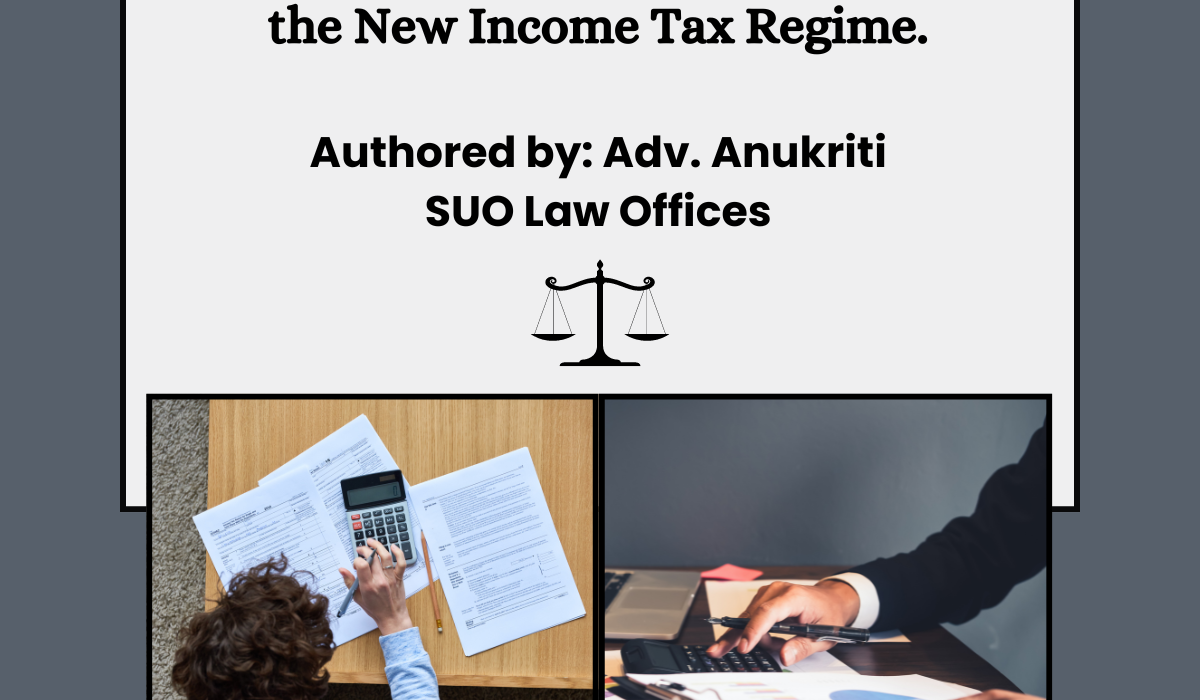SEVERAL HIDDEN EXEMPTIONS ALLOWED UNDER THE NEW INCOME TAX REGIME
Contrary to the common belief, taxpayers can avail themselves of tax exemptions in the new regime. These exemptions offer opportunities for taxpayers to lower their tax obligations by covering a variety of areas, including investments, allowances, deductions, and certain expenses. Thus, to maximize tax savings under the new tax framework, one must comprehend and take advantage of these exemptions.
- House Loan Interest tax exemptions: It is crucial to understand that under the current tax system, taxpayers may also benefit from tax exemptions on home loan interest in specific situations. In particular, when people pay interest on a loan on a home they have rented out, they are eligible to claim the tax exemption under Section 24 (Deductions from income from house property) of the Income Tax Act on home loan interest. With the use of this provision, taxpayers can lower their taxable income by offsetting the interest paid on their home loan against the rental income they get from it. With the tax law offering incentives and tax benefits, this exemption is a great chance for people to invest in real estate for rental income.
Section 24 of the Income Tax Act lets homeowners claim a deduction of up to Rs. 2 lakhs on their home loan interest if the owner or his family resides in the house property. The entire interest is waived off as a deduction when the house is on rent.
- Gifts tax exemptions: Taxpayers who receive gifts within a single fiscal year are eligible for tax exemptions. There is a restriction, though: the gift sum can’t go above a certain amount. Under this provision, taxpayers are free from income tax on gifts up to Rs 50,000 made within a fiscal year. Up to the designated maximum, this allowance gives people the chance to accept presents from friends, family, or other people without having to pay taxes on the money they receive.
- Employee Compensation and Allowances: An employee may be eligible to claim income tax exemption on any remuneration received from the Company in the event of a transfer or company-sponsored trip. Further benefits or facility fees that you get from the office may also be excluded from income tax. For example, if an employee is given the opportunity to work remotely from a different place and is compensated for corresponding expenditures, such lodging or travel expenses, they are also eligible to claim an income tax exemption on these allowances.
- Disabled Individuals: For taxpayers who are disabled, there is a distinct exemption provision. This provision allows disabled people to seek an exemption from income tax on whatever transport allowance they receive. It is notable that personnel of both the public and commercial sectors are covered by this exemption.
- Gratuity and leave encashment for VRS (voluntary requirement) recepients: Under Section 10(10C) of the Income Tax Act, individuals are eligible for income tax exemption on gratuity and leave encashment amounts, even after opting for voluntary retirement (VRS). Therefore, individuals who choose to take VRS can still avail themselves of the tax benefits associated with gratuity and leave encashment payments. These exemptions provide significant financial relief to employees transitioning into retirement, ensuring that they can effectively manage their finances during this period of change. It’s important for individuals planning for retirement through VRS to consider these tax benefits and incorporate them into their financial planning strategies accordingly.
The provisions regarding income-tax exemption on the amount receivable on account of voluntary retirement are separate from the provisions which govern taxation of provident fund, gratuity, pension, etc. [Circular No. 640 dated 26.11.1992]. Thus income tax exemption on the ex gratia amount of voluntary retirement is available even when the amount payable is in addition to normal retirement benefits such as provident fund, gratuity, commuted pension etc. payable under the terms of employment. These terminal benefits cannot be brought within scope of ‘amount received’ under IT Sec 10(10C) [SAIL DSP VR Employees Association 1998 v Union of India (2003) 262 ITR 638 (Cal)].
Further, the exemption will be available even when the scheme of voluntary retirement impliedly satisfies the conditions laid out in IT Rule 2BA [Chandra Ranganathan v CIT (2010) 15 SCC 395].
- Standard deduction: A standard deduction of Rs.50,000 (regardless of the income level) from Income from Salary/Pension may be claimed by persons in pursuance with Section 16(1) (Deductions from salaries) of the Income Tax Act. With the use of this provision, taxpayers can lower their taxable income by a certain amount without having to make any special investments or costs. This standard deduction is intended to alleviate the tax burden on seniors and salaried individuals. Taxpayers can successfully lower their tax obligation by taking advantage of this deduction, keeping more of their income for personal savings and spending.
The provisions under the Income Tax Act include tax deductions on certain investments and/or expenses, which one can claim from their total income which will result in reduced taxable income and significantly reduced overall tax liability.
Authored by: Adv. Anukriti, SUO Law Offices



